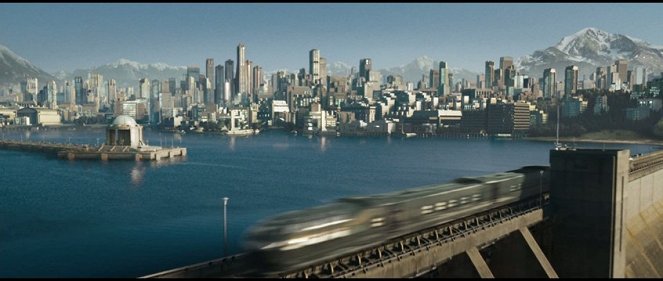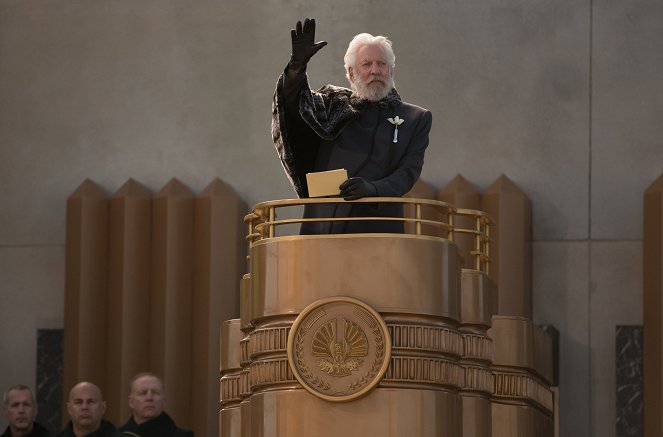Directed by:
Francis LawrenceCinematography:
Jo WillemsComposer:
James Newton HowardCast:
Jennifer Lawrence, Josh Hutcherson, Donald Sutherland, Woody Harrelson, Philip Seymour Hoffman, Jena Malone, Sam Claflin, Jeffrey Wright, Liam Hemsworth (more)VOD (1)
Plots(1)
Every year in the ruins of what was once North America, the evil Capitol of the nation of Panem forces each of its twelve districts to send a teenage boy and girl to compete in the Hunger Games. A twisted punishment for a past uprising and an ongoing government intimidation tactic, The Hunger Games are a nationally televised event in which "Tributes" must fight with one another until one survivor remains. Pitted against highly-trained Tributes who have prepared for these Games their entire lives, Katniss is forced to rely upon her sharp instincts as well as the mentorship of drunken former victor Haymitch Abernathy. If she's ever to return home to District 12, Katniss must make impossible choices in the arena that weigh survival against humanity and life against love. (official distributor synopsis)
(more)Videos (35)
Reviews (16)
Greater emotional richness, surprising creative courage, and a healthy self-confidence behind and in front of the camera. In most aspects, it's just as complete an explosion as the original (and even my favorite installment). In the wrong hands, it could easily have become a tearful prologue from the first half on, but fortunately, that did not happen. The spark slowly turns into a flame, and when Peeta becomes a clear leader and Johanna steals all the scenes in such limited space, Catching Fire is a winner. Although there isn't too much space devoted to the history of the Quarter Quell or the individual veterans over the extra fast-paced half-hour, thanks to a more coherent picture, it is almost the best film installment. But there would still be more to come.
()
I was really terrified of the two hours and a half of runtime, as I should’ve been. The first 30 minutes passed awfully slowly, I almost thought that I wouldn’t make it through and just give up on the movie. But I still thought that it would somehow get better and I’d start liking it, which happened in the end. Since Katniss made it into another arena, things started to get really fun. Maybe even more fun that in the first movie. From that point on, the remaining two hours flew by like a breeze and the movie suddenly became a successful blockbuster. That’s what made me so skeptical of the final two-piece movie. Because so far, the only thing I found fun about Hunger Games were the arena fights. Everything else from the politics to the war went completely over my head.
()
It’s quite a paradox that the second Hunger Games was accused a priori by critics of being a teenage romance like Twilight, and yet, there’s hardly any romance in it, or rather, there is no more than in any other Hollywood blockbuster. In short, the romantic line between Katniss, Peeta and Hurricane has now been put in the background and serves only for a deeper portray of the characters and the emotional state of the heroes within the reality of a totalitarian system, instead of being the centre of it all. Other than that, it’s pretty brutal dystopian sci-fi. The leaders of the Capitol have turned from funny colourful clowns into unscrupulous totalitarian douchebags worthy of respect. The first half has excellent pace and tells us more about how that world works, while the socio-medio-political line doesn’t feel stupid. The weakest part is the one in the Arena, which needs to have several scenes with more action (up until then it’s mostly a conversational film) and it’s only a slight variation of the events of the first part. I understand why it had to be there, but it was more fun when the heroes were on the victory tour as mediators in the relationship between the oppressed public and the governing class. The ending, on the other hand, comes too suddenly; that which was only said would have probably been better shown in a couple scenes more. In any case, I’m looking forward to the next sequel.
()
It’s ridiculous and sad when one reads the reactions to the second instalment of The Hunger Games with a constant stream of disparaging comments because the film is primarily targeted at girls, even though those same people uncritically praise Marvel comic-book movies. In comparison with those, the positive aspects of Catching Fire are readily apparent, dispensing with the prejudices associated with the “chick flick” genre and even showing that, thanks to such books and films, today’s adolescents have much more complex and enriching role models than previous generations. Catching Fire uses the same production concept as top-tier comic-book flicks, so it also has a generous budget, a director who is rather more associated with dramatic titles than with a distinctive creative signature in terms of handling action scenes, and excellent or at least solid actors who give the characters individuality solely through their presence. Whereas in comic-book movies this is a way of humanising half-tone characters who never had more complex character traits but rather represented certain heroic or mythic ideals, here truly ambiguous personalities with far more thoughtful and non-formulaic natures are brought to life. Similarly, whereas comic-book movies draw their sophistication from relating to their own canon, traditional myths and the contemporary socio-political atmosphere, The Hunger Games does not thematise the heroic side of heroism, but its relativity and artificiality, thus revealing that the heroes of today are mere constructs or personalities exploited in the interest of a certain ideology (whether ruling or revolutionary) and then chewed up and spit out by PR specialists and the tabloid press. The heart of The Hunger Games is its central character, Katniss Everdeen, who is not a demigod from another planet, a billionaire dandy or any other kind of privileged pseudo-personality, but an ordinary girl with ambiguous personality traits who came into a world where she is forced to play a certain role. While plans for revolution are cooked up around her and grand speeches about destiny are made, she has her own motivation: an entirely anti-heroic, egocentric effort to ensure that she and her loved ones can get out alive and live their own lives. The conflict between the private and public worlds and between real personalities and marketing constructs form the core of Catching Fire’s narrative, which is strictly defined against the world of superficiality and fleeting glory. That can’t really be said about the stories of privileged heroes living in splendour. Of course, even in The Hunger Games, this criticism is relative and doesn’t reach the harshness or vitriol of biting satires or openly anti-consumerism pamphlets. But that’s not the purpose of the film. Rather, the aim of the film is merely to give young people – not just girls – a positive role model who frees them from the fallacies foisted on them by lifestyle magazines and dully conservatives films and series.
()
(less)
(more)
Unarguably better, but still not good (enough). Lawrence realizes that stiff, paper-rustling dialogs full of life wisdom and great truths can only be saved from ridicule by actors with a big A and so tries to sideline non-actor “J-14"-type heartthrobs like Hemsworth and Hutcherson as much as possible. And he manages to do this in the first half. However as soon as (upon entering the arena) he loses the chance to rely on Harrelson/Hoffman/Tucci//Banks and mainly Sutherland (earning great respect for giving such a fine performance one of the dumbest villains), he is lost and the entire movie with him. Suddenly he is left only with beauties with no talent and he is unable to hide their lack of talent even with emphasis on the solid action ingredient which fails because everything important (and interesting) happens off screen.
()



Ads